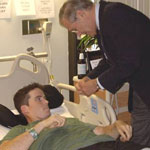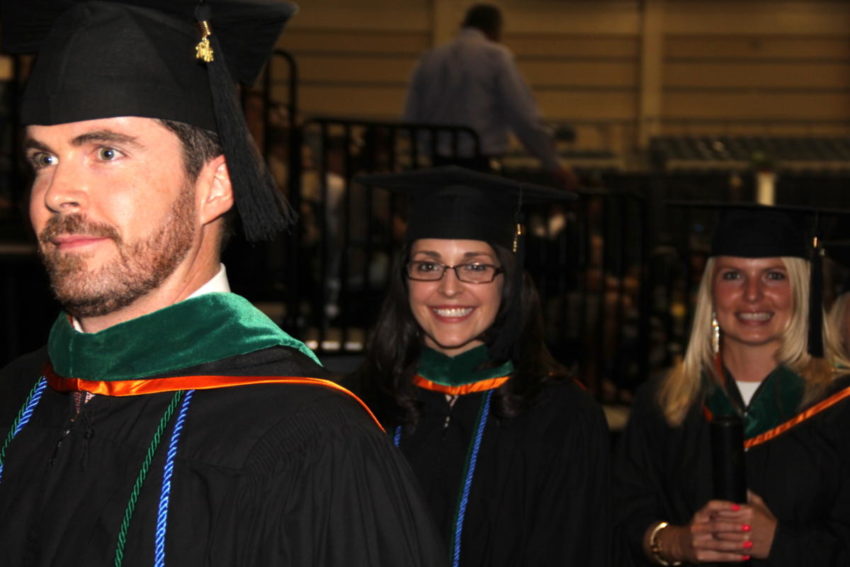SAN ANTONIO (June 24, 2012) — Four years after he lost both legs above the knees to a roadside blast in Afghanistan, U.S. Army Special Forces Medic Roland Paquette walked on prosthetic legs to a classroom at the UT Health Science Center San Antonio. In June 2009 the Green Beret began his educational journey to become a physician assistant.
In May, this hero to our country received his Master of Physician Assistant Studies degree from the School of Health Professions as one of 741 students who graduated this spring from the UT Health Science Center. Paquette, 34, said he wants to show others that there is life after a life-changing injury.
Decision to become a soldier
Paquette flirted with the idea of joining the military during his college days at the University of New Mexico. After the events of Sept. 11, 2001, he grew more firmly committed to the idea. “I just felt like if anybody was going to do it at that time, it should be me — why not me?” he recalled.
He entered the Army as an enlisted basic infantryman and moved through a training pipeline to become a Special Forces medic, graduating in 2004 and being assigned to the 3rd Special Forces Group at Fort Bragg, N.C.
Fateful day on the road
He was deployed in 2005 to Afghanistan. “I was there nine months and really enjoyed the experience,” he said. “Then I was injured by an IED (improvised explosive device) blast, a couple of anti-tank mines placed off the side of the road.”

The mines detonated under the Humvee he was driving, propelling Paquette upward. The blast bounced off the radio mount between a passenger and Paquette, turning him in midair so that he hit the roof of the cab on his side rather than head on. “Even though it was a horrific event, it was only by the sheer grace of God that I’m not dead,” he said.
The truck was in a “mighty big crater,” he said. He was able to crawl away from the vehicle on his back and elbows, and it was then he saw his right foot was traumatically amputated and the other was barely attached. Thankfully his fellow soldier in the gun turret was ejected and not seriously injured.
Purple Heart
Paquette was taken to Kandahar in southern Afghanistan, where an orthopaedic surgeon completed the amputation of both legs above the knee.
In January 2006, upon his return to American soil, he received the Purple Heart from Defense Secretary Donald Rumsfeld at Walter Reed Army Medical Center. Family and friends took care of their two children in Albuquerque, N.M., while his wife, Jennifer Paquette, stayed by his side at Walter Reed. About a month after the injury he was fitted with prosthetics. “I know I have to rely on man-made mechanical parts to be successful in life,” he said.
Serving others as a PA
Many times he asked why the IED blast happened to him, and came to the conclusion that there isn’t a good answer. But he is confident, in his role as a physician assistant, that he can help other people who experience similar obstacles. He also works with other soldiers through the not-for-profit Green Beret Foundation, where Jennifer is executive director.
“The key to the emotional rehabilitation is to understand you’re not going to move on exactly as you did in the past,” he said. “Once I accepted that, things became much better.”
New legs
His prostheses are state of the art. The upper parts consist of carbon fibers, and the lower parts have microprocessor units and five gyroscopes that sense acceleration and direction, providing support and stability. “It would be impossible for me to have these prostheses without the VA (U.S. Department of Veterans Affairs),” Paquette said.
The VA paid about $100,000 for these vital components of his daily life. The Center for the Intrepid, next to Brooke Army Medical Center in San Antonio, also rendered prosthesis services.
“Kirk Simendinger, previously at the Center for the Intrepid and now at a private prosthetics company, has been my prosthetist for around five years,” Paquette said. “I would not have been able to complete this final year of the physician assistant studies program or have confidence moving forward into my career without his help.”
Attitude of persistence
Paquette completed clinical rotations at University Hospital, in private clinics in San Antonio, and two rotations in New Braunfels in a pediatrics office and an orthopaedics office. He is a steady worker, a trait taught by his parents, he said. Persistence is a key to his education and life, especially after Afghanistan.
“I love my country,” he said. “Had I not gotten injured, I would still be in the military. My only regret is I did not drive 20 feet to the right or left of the mines. Now I am trying to use my injury in a way that benefits somebody else.”
The University of Texas Health Science Center at San Antonio, one of the country’s leading health sciences universities, ranks in the top 3 percent of all institutions worldwide receiving federal funding. Research and other sponsored program activity totaled $231 million in fiscal year 2011. The university’s schools of medicine, nursing, dentistry, health professions and graduate biomedical sciences have produced approximately 28,000 graduates. The $736 million operating budget supports eight campuses in San Antonio, Laredo, Harlingen and Edinburg. For more information on the many ways “We make lives better®,” visit www.uthscsa.edu.


